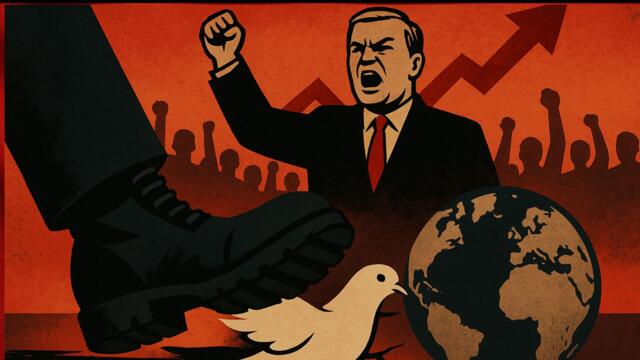- Blogs
- The Rise of Right-Wing Populism: A Global Threat to Tolerance?
The Rise of Right-Wing Populism: A Global Threat to Tolerance?

Ayesha Zaka
In the past decade, the world has encountered a powerful surge in right-wing Populist politics. From India to Pakistan, Israel to parts of Europe, a pattern has appeared where religious identity, nationalism, and emotional narratives are taking the limelight in political discourse. These actions often claim to represent the “true people” against outsiders, corrupt elites, or minorities. Yet they talk in the name of the masses. Their flow is increasingly threatening pluralism, tolerance, and democratic values.
Right-wing populism is deeply seated in a few common ideas: a strong belief in religious identity or national identity, discredit of bureaucratic elites and intellectuals, grievances toward immigrants or minorities and an idealised past that must be restored. Although not all populist movements are oppressive or violent, they mainly lean on polarising rhetoric that splits the society into “us” and “ them”. They frequently use the tools of speeches, media, democracy and elections to attack the foundations of democratic culture.
India gives one of the most remarkable examples of this shift. Since the BJP and Prime Minister Narendra Modi took power, the ideology of Hindu nationalism has become severely embedded into India’s political fabric and laws. Actions and laws like the Citizenship Amendment Act, such as the eradication of Kashmir’s autonomy, have aroused fears of growing intolerance. The Muslim minority of India, which once formed an essential part of its secular democracy, now faces increasing social exclusion, discrimination and violence. Platforms like social media played a key role in circulating disinformation, hate speech and mobilising mobs, creating a digital place a battleground for identity crisis.
In Israel, right-wing populism combines religious conservatism and nationalism. The alliances of Prime Minister Benjamin Netanyahu with ultra- nationalist and religious parties have hardened to an extreme stance on Palestinian issues and a thoroughly divided Israeli society. The actions of the government in Gaza and its internal judicial reforms have provoked global criticism and protests. The majority fears that this new political direction is disabling democratic checks and creating space for religious and racial intolerance to grow unchecked.
Pakistan shows another pattern of right-wing populism, directed more by ethnic nationalism and religion. Tehreek-e-Labbaik Pakistan (TLP) is a practical example. Appearing from street protests over blasphemy issues, TLP positioned itself as a defender of Islam and the Prophet’s honour. It created a strong presence in national politics with mass mobilisation and emotional slogans despite having less interest in governance and policy-making. Its growth has normalised the use of religious sentiments for political gain, blurred the line between state and street power, and limited freedom of expression.
In Europe, right-wing populism is mainly centred on cultural identity, immigration and fear of globalisation. Parties like Hungary’s Fidesz, Spain’s Vox, France’s National Rally and Poland’s Law and Justice have pushed forward anti-Muslim, anti-immigrant and anti-EU narratives. Their message is simple:
“Our way of life is under threat”
These measures often ignore the humanitarian and economic divisions of immigrants and instead pay attention to national pride and cultural purity. As a result, the steady erosion of civil liberties and xenophobia increased. What links these movements globally is their use of fear-based politics. Leaders exploit fears regardless of economic stability, outsiders, or cultural change to justify aggressive rhetoric. Their communication frequently resonates not because it provides a real solution but offers a sense of belonging, identity and anger-driven unity. Fake news, social media manipulation and Disinformation help maintain this momentum of emotion, silencing rational debate and moderate voices.
The outcome of this global populist wave is dangerous. The communities of minorities live increasingly in fear. Civil discourse is replaced by tribalism and rage. Dissent is identified as betrayal. Political opposition is marked as foreign-sponsored or anti-national. In many situations, violence becomes normalised in the name of religion or patriotism. Change can still happen. Civil society, young activists, independent media, and even political leaders are proceeding to challenge this tide. The security of diversity, tolerance, and democracy is not a one-time event; it's an unfolding effort. Promoting inclusive education, strengthening democratic institutions, and encouraging critical thinking are crucial steps. There is a need to confront hate speech and protect the spaces for debate and open dialogue.
Right-wing populism is not just another ideology; it’s a mirror that shows how weak our social harmony can be. If we let anger, fear, and division shape our politics, we risk losing the fundamental values that secure us together. The question isn’t whether populism will continue to increase; it's when we’ll find the courage to counter it without becoming intolerant.
Disclaimer: The views expressed in this article are solely those of the author and do not necessarily reflect the official stance of The Himalayan Research Institute Pakistan - (THRIP)
_________________________________
Ayesha Zaka is studying BS political science at Kinnaird College University Lahore.
Contact us

Write with Us
The Himalayan Research Institute is proud to introduce "Himalayan," a dynamic and insightful magazin...
- [email protected]
- +923426470466
- website
